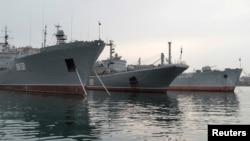Russia's Black Sea Fleet was founded in 1783, and almost immediately proved its strategic importance, defeating Ottoman naval forces and cementing Russia's hold over the Crimean peninsula.
More than two centuries later, many see the fleet as playing the same role, defending its right to a territory that others -- this time Ukrainians -- claim as their own.
Many Ukrainians are angry, noting that under the terms of a post-Soviet accord, the fleet was due to withdraw from Crimea by 2017, removing Russia's toehold in the region once and for all.
But that agreement was controversially extended by Viktor Yanukovych, the pro-Russian Ukrainian leader ousted from power last week amid mounting Euromaidan protests.
Yanukovych, who came to power in February 2010, signed the extension as one of his first points of business.
Under the terms of the deal, signed in Kharkiv with then-Russian President Dmitry Medvedev, Ukraine would get a 10-year discount on Russian gas. In return, the Russian Navy would remain in Sevastopol for an additional 25 years, until 2042.
The deal was deeply unpopular with Ukraine's opposition lawmakers, who threw punches, eggs, and smoke bombs when it was brought before parliament for ratification.
The agreement passed despite the chaos, with then-speaker Volodymyr Lytvyn announcing the ratification after seeking shelter behind an umbrella.
More than two centuries later, many see the fleet as playing the same role, defending its right to a territory that others -- this time Ukrainians -- claim as their own.
Many Ukrainians are angry, noting that under the terms of a post-Soviet accord, the fleet was due to withdraw from Crimea by 2017, removing Russia's toehold in the region once and for all.
But that agreement was controversially extended by Viktor Yanukovych, the pro-Russian Ukrainian leader ousted from power last week amid mounting Euromaidan protests.
Yanukovych, who came to power in February 2010, signed the extension as one of his first points of business.
Under the terms of the deal, signed in Kharkiv with then-Russian President Dmitry Medvedev, Ukraine would get a 10-year discount on Russian gas. In return, the Russian Navy would remain in Sevastopol for an additional 25 years, until 2042.
The deal was deeply unpopular with Ukraine's opposition lawmakers, who threw punches, eggs, and smoke bombs when it was brought before parliament for ratification.
The agreement passed despite the chaos, with then-speaker Volodymyr Lytvyn announcing the ratification after seeking shelter behind an umbrella.
